Here's the second half of my recent viewing, minus a couple cheesy anime tentacleporn titles (though if people want to hear that as well I don't mind writing comments about it, we try to be equal-opportunity film-appreciators here at linespalsyhenge)...
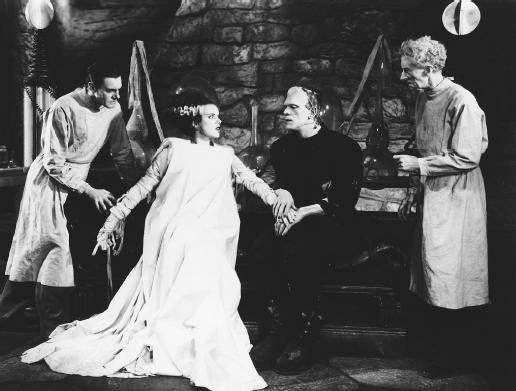 The Bride of Frankenstein
The Bride of Frankenstein (Whale, 1935)
Really entertaining sequel with a good deal of humor and pathos. What gets me is the really somewhat touching transformation of Frankenstein's monster from a grunting homunculus into a bitter antihero who "loves the dead, hates the living." I also really enjoyed the almost Tod Browning-esque villain in this one, Dr. Pretorius who blackmails and bullies a reluctant Dr. Frankenstein into starting over.
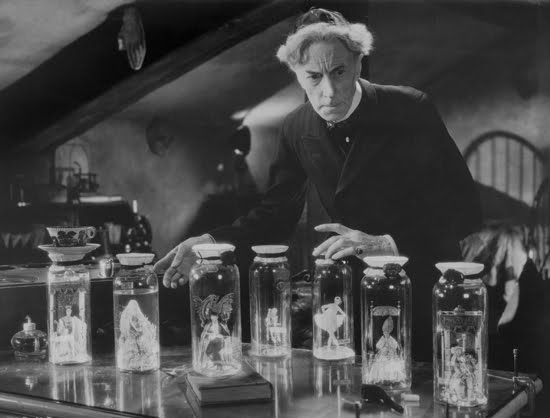
Somehow, even though this time they're building brains from scratch rather than robbing "abnormal" ones, the view of science in this one seems a lot madder.
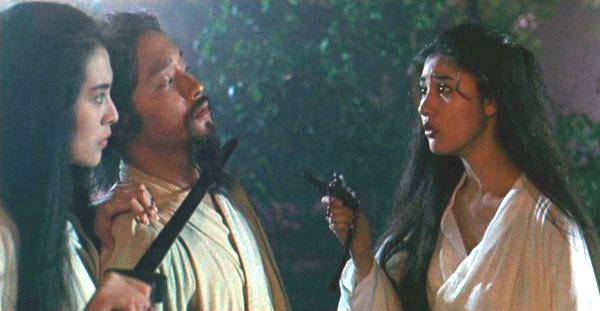 A Chinese Ghost Story II
A Chinese Ghost Story II (Siu-Tung, 1990)
Lame follow-up to the more-engaging Chinese Ghost Story, which both is and isn't a direct sequel to that movie. The bad guy this time is a stock corrupt official who it turns out is actually a papier mache cross between a giant caterpillar and a dragon.
.jpg) My Son, My Son, What Have Ye Done
My Son, My Son, What Have Ye Done (Herzog, 2009)
Another one that ended up feeling a bit slow and overlong, this movie is about a man who goes crazy after hearing an inner voice while on a journey in Peru. After moving back in with his mother in California he tries becoming an actor in Greek tragedy that recapitulates what he thinks is his relationship with the gods. This movie has some decent lyrical passages, including Herzog's typically hypnotic sound design, but he's done better films than this. What is interesting is that the main character's apparent transformation came about when he decided
not to go on a Herzogian river journey, but I don't think that will mean much to people who haven't already seen at least Aguirre and Fitzcarraldo.
 Wise Guys
Wise Guys (De Palma, 1986)
Middling comedy about incompetent gangsters that starts picking up towards the end. One of the weakest De Palma films I've seen.
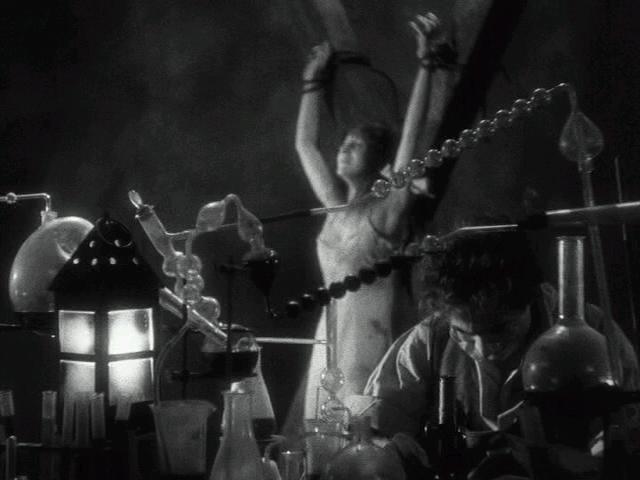 The Murders in Rue Morgue
The Murders in Rue Morgue (Florey, 1932)
Cleverly photographed vehicle for Bela Lugosi to play a swarthy, ethnic mid-19th century mad scientist and carnival performer, who will "prove" man's relationship to the apes by abducting beautiful women and giving them fatal injections of primate blood. I don't know what was so effective about the idea ape-human miscegenation to movie audiences but it's all over 1920s/early 1930s horror films and it seems to be connected with something primal and dangerous that we'd better keep in a cage along with "science". In spite of some mild titillation I think it was used to both greater and odder effect in the original King Kong (1933) and Tarzan the Ape Man (1932).
 City Hunter
City Hunter (Wong Jing, 1993)
Jackie Chan plays a womanizing private eye on a hijacked cruise ship in this Cantonese comedy adapted from a Japanese comic. I'm not familiar with the tone of the manga but this film has plenty of jokes at the expense of both Americans and Japanese. Many of the gags swing wide and miss but there's enough goofy randomness that it winds up being pretty entertaining.
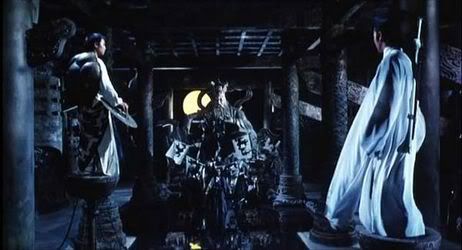 Zu: Warriors From the Magic Mountain
Zu: Warriors From the Magic Mountain (Tsui, 1983)
Recently watching House on dvd made me want to go back to this anti-realist wuxia epic by Tsui Hark. When I say it's anti-realist I mean this movie is truly gratuitous with the special effects, and at times it can get kind of exhausting when the plot is so condensed and almost every shot seems like a special-effects shot. The story becomes a convoluted mess by the third act and it's worth noting that it apparently condenses a very long (50-volume) work that really seems to span ages into a 90-minute film, but it starts off cleanly enough, with a color-coded satire of war that almost seems to be a parody of itself. The hero is Yuen Biao (Once Upon a Time in China, Wheels on Meals, The Prodigal Son) as a low-ranking soldier who escapes his army after being sentenced to death because his superiors can't agree on his orders. The first arc of the movie progresses through a series of comically nonsensical battles, but the movie really picks up after the soldier escapes by running down the side of a cliff, only to become embroiled in a supernatural war between factionalized mystic swordsmen (and women) and a "blood demon". It turns out this is the root of all evil in the hearts of men, but the movie gives you plenty of reasons to be skeptical of such a simplistic, quasi-astrological explanation for warfare and, as the hero bluntly points out, even the enlightened forces of good in the movie seem perpetually bogged down in petty disagreements. Some of this is a little callow but for me here is where the overblown cosmology and chaotic script actually work in the movie's favor by keeping you guessing what the point is well after the movie has ended. Once you get past the Tron-ish laser effects the whole production-design is actually pretty brilliant, including a battle riding giant stone elephants in a ice-fortress full of beautiful women, and some fantastic editing and wire-work. The camera-work is consistently exciting and imaginative; where else prior to cg are you going to see one character anchored on the floor while another runs along the ceiling?
I'm giving it a pretty high
based on how much I enjoyed it. Anyone remotely interested in old special effects movies should see it, though I don't think it's currently available on dvd.
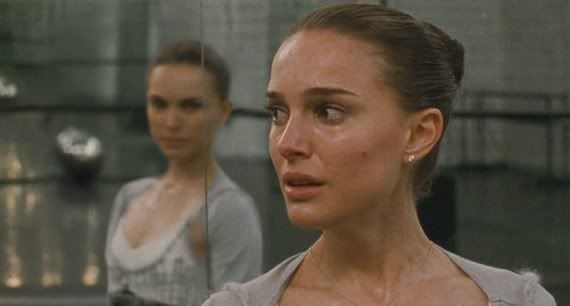 Black Swan
Black Swan (Aronofsky, 2010)
A dark fantasy/thriller from Aronofsky about an unstable dancer and with some very impressive subjective camerawork that really takes part in the dance. Well worth seeing on the big screen and I found it pretty engaging but based on my first viewing I'm leaning towards a high
vs. a lower
.
 Young Frankenstein
Young Frankenstein (Brooks, 1974)
One of my girlfriend's favorites and easily my favorite Mel Brooks film right now. The movie has some beautiful black and white cinematography, science fiction, and movie humor so there should be something for everyone here.
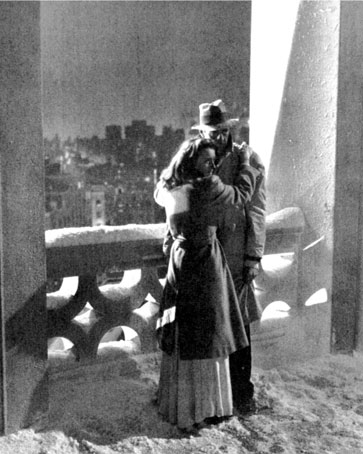 Meet John Doe
Meet John Doe (Capra, 1941)
There's a lot I just didn't find very engaging about this movie, particularly in the romance between an all-too-human reporter and the larger-than-life everyman she creates, but Capra really does shoot and edit some lovely scenes. Even the crappy transfer I saw couldn't ruin the effectively-silent final scene. While there's a lot of complexity in Capra's portrayal of the moral/immoral core of America, the heavy-handed speeches made it a bit of a grind for me and the character I found the most sympathetic was the principled bum who just wants to escape the whole movie. That character argues for an idealized view of poverty but hey, I've been celebrating anti-realist films lately.
mark f ties Capra's sentimentalism to Spielberg's and that seems accurate, but Meet John Doe also seems to be a direct ancestor to Network, which (I think) is still one of my favorites. So it's interesting but overall I just didn't enjoy it enough not to give it my lowest passing score.
 Time of the Gypsies
Time of the Gypsies (Kusturica, 1988)
Perhaps I'll write more about this movie later but it's an impressionistic modern classic and a precursor to Kusturica's Black Cat White Cat (1998). This one is overall the more cinematic and memorable film but it's also painful, even if it has a good deal of humor.
 , but that's not really what you watch this type of movie for. It provided a few decent action scenes, but one thing I thought it lacked was some of the suspense of the original.
, but that's not really what you watch this type of movie for. It provided a few decent action scenes, but one thing I thought it lacked was some of the suspense of the original.


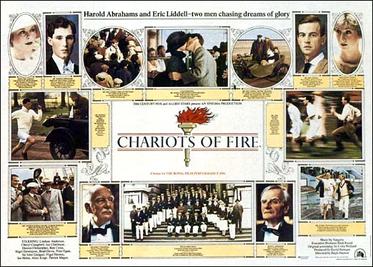










.jpg)






